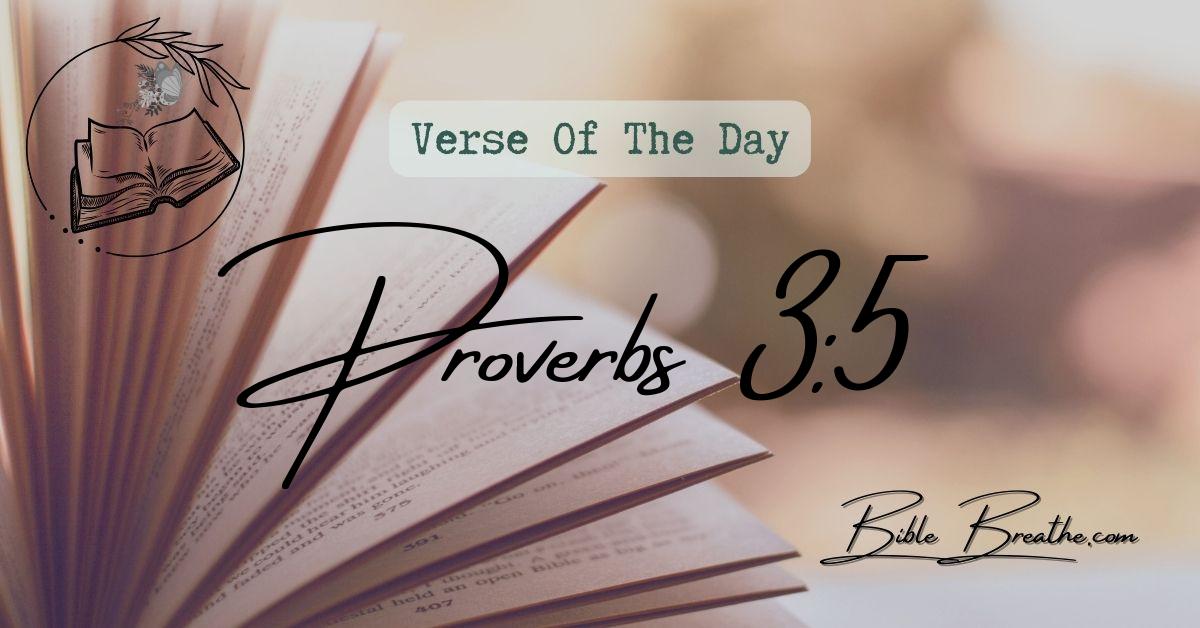From the treasury of Biblical wisdom, we find Proverbs 3:5 urging us, “Trust in the Lord with all your heart and lean not on your own understanding.”
Now, why does this particular verse captivate the souls of many?
It’s the embodiment of relinquishing control, of anchoring our faith deep within the divine, and challenging our human tendencies to rationalize and lean on our own limited perceptions.
Imagine being handed a puzzle with over a thousand pieces.
You see fragments of colors, edges, and tiny details, but you don’t have the picture box to guide you.
That’s our understanding — fragmented and often confusing.
Now, envision that the Lord’s wisdom is that very picture on the box — complete, holistic, and perfect.
Why would we ever choose to ignore the master blueprint?
Isn’t it ironic?
In a world saturated with information, it’s easy to feel we possess enough knowledge to navigate life’s winding paths.
Yet, deep down, a voice reminds us that our understanding can’t compete with the ancient, timeless wisdom from above.
Have you ever paused to reflect on the times when you forged ahead with your own plans, only to realize that a higher plan was unfolding all along?
The Proverbs 3:5 meaning isn’t just a call to blind faith.
It’s an invitation to a deep-rooted trust, a dance between faith and understanding.
To truly grasp the essence of this scripture, it’s paramount we open our hearts wider than our minds, for in doing so, we become conduits of divine wisdom in a modern world that so desperately seeks it.
So, when doubts emerge or paths seem uncertain, remember — our best understanding is but a fragment of God’s master design.
Will you trust in His blueprint today?
Key Takeaways
- Proverbs 3:5, with its call to “Trust in the Lord with all your heart,” emphasizes the profound reliance believers should place on God’s wisdom and understanding over their own.
- “Do not lean on your own understanding” underlines the limitation of human insight compared to the boundless wisdom of God, urging believers to prioritize divine guidance.
- In today’s fast-paced world, laden with decisions and dilemmas, Proverbs 3:5 acts as a compass, pointing individuals towards reliance on divine guidance rather than solely on human intellect.
- Its contemporary application is a reminder that, especially in challenging times, leaning on faith and God’s understanding can offer solace, direction, and clarity.
- This timeless verse encourages individuals, both in personal and societal realms, to anchor their actions, choices, and beliefs in the unwavering trust that God’s perspective surpasses ours, ensuring a path that aligns with His greater purpose.
Proverbs 3:5: Diving Deep into a Beacon of Trust
Just as a lighthouse guides sailors through dark nights and stormy seas, the Bible offers direction to all who seek solace and guidance.
One such beacon of hope is found in Proverbs.
Verse of the Day:
“Trust in the LORD with all thine heart; and lean not unto thine own understanding.” – Proverbs 3:5, KJV
Basic facts of the verse
| Attribute | Value |
|---|---|
| Book | Proverbs |
| Chapter | 3 |
| Verse | 5 |
| Christian Bible part | Old Testament |
| KEYWORDs | Trust, Lord, Understanding |
| Topics | Faith, Wisdom |
| Bible Themes | Dependence on God |
| People | Solomon |
| Location | Israel |
In the ever-changing landscape of our modern world, isn’t it reassuring to have an anchor like Proverbs 3:5?
As we plunge into the depths of this scripture, we discover that its call isn’t just to superficial belief, but to a trust so profound that it challenges the very fibers of our human understanding.
Imagine you’re embarking on a challenging hike.
The map and compass are your understanding, but the voice of the seasoned guide echoing, “Trust me”, is that of the Lord.
How many times have we hesitated at the crossroads of decision, armed with our little maps, only to realize later that the guide’s path was the surest?
Embracing the Proverbs 3:5 meaning enriches our spiritual journey, urging us to relinquish our limited human comprehension and lean wholeheartedly on the timeless Biblical wisdom.
In a world overflowing with information, yet parched for true understanding, will you choose to dive into the deep well of faith and drink deeply?
Proverbs 3:5 KJV Cross References
These are some Bible verses related to Proverbs 3:5:
| **Cross Reference Verse (KJV)** | **Verse** |
|---|---|
| Psalm 37:5 | Commit thy way unto the Lord; trust also in him, and he shall bring it to pass. |
| Isaiah 26:4 | Trust ye in the Lord forever: for in the Lord Jehovah is everlasting strength. |
| Psalm 56:3 | What time I am afraid, I will trust in thee. |
| Proverbs 22:19 | That thy trust may be in the Lord, I have made known to thee this day, even to thee. |
| Psalm 118:8 | It is better to trust in the Lord than to put confidence in man. |
| Psalm 125:1 | They that trust in the Lord shall be as Mount Zion, which cannot be removed but abideth forever. |
| Proverbs 16:20 | He that handleth a matter wisely shall find good: and whoso trusteth in the Lord, happy is he. |
| Isaiah 12:2 | Behold, God is my salvation; I will trust, and not be afraid: for the Lord Jehovah is my strength and my song; he also is become my salvation. |
| Psalm 62:8 | Trust in him at all times; ye people, pour out your heart before him: God is a refuge for us. Selah. |
Proverbs 3:5: A Glimpse into the Past Illuminates Present Understanding

Photo modified by BibleBreathe.com. Original photo by Rocco Dipoppa on Unsplash
Delving into Proverbs 3:5 is akin to stepping back into a grand tapestry of history, an era where wisdom was both a guiding principle and a survival tool.
“Trust in the Lord with all thine heart; and lean not unto thine own understanding.”
This profound exhortation resonated deeply within the ancient Hebrew context.
The book of Proverbs, attributed to King Solomon, was penned around the 10th century BC.
This was an epoch marked by Israel’s united monarchy — a pinnacle of political stability and economic growth.
However, in the backdrop loomed threats of foreign empires and the ever-present challenge of maintaining cultural and religious identity amidst neighboring pagan influences.
Picture a society where survival wasn’t guaranteed.
Every decision, every alliance, and every act of trust had profound consequences.
The societal norms emphasized reliance on ancestral wisdom, cementing the importance of trusting in age-old divine guidance over transient human judgment.
In this historical tapestry, can you see why Proverbs 3:5 was not merely advice but a lifeline?
The ancients, grappling with complex political dynamics and existential threats, were being reminded to place unwavering trust in the Lord’s wisdom.
The scripture understanding during these times wasn’t a mere academic endeavor; it was an urgent call to anchor oneself amidst the tempests of life.
So, when we reflect upon the Proverbs 3:5 meaning, are we not echoing the same primal yearning for guidance and assurance that our ancestors felt?
Are our modern crossroads so different from their ancient dilemmas?
Amidst our present-day chaos, might we also find solace, clarity, and direction by leaning into that same eternal wisdom?
For isn’t the essence of faith and understanding timeless, bridging both the then and the now?
Proverbs 3:5: Unlocking the Treasures Word by Word
Delving into Proverbs 3:5, it’s like opening an ancient treasure chest, where each word holds a gem of profound significance.
Let’s embark on this exploration, breaking it down phrase by phrase, word by word.
- Trust in the Lord:
- “Trust” here is translated from the Hebrew word “batach”, which implies a feeling of safety or security. This isn’t a casual trust; it’s a deep-rooted reliance, akin to a child’s unyielding trust in a parent.
- “Lord” references the Hebrew name for God, “YHWH”, the eternal, self-existent One. When these two words pair, it’s a call to place our deepest trust in the Everlasting One.
- with all thine heart:
- “Heart”, in Hebrew “lev”, isn’t just the physical organ. It represents the seat of emotions, will, and intellect. Imagine trusting not just with a fraction, but with the entirety of your being, emotions, thoughts, and decisions.
- and lean not unto thine own understanding:
- “Lean” carries a connotation of support. Picture someone leaning on a walking stick. Now, visualize that stick breaking suddenly. That’s the unpredictability of relying solely on human understanding.
- “Understanding”, or “binah” in Hebrew, refers to discernment or insight. The exhortation here isn’t about dismissing our intellect but warning against making it our primary foundation.
Relating this verse to the broader theme of Proverbs, we recognize a recurrent motif: the juxtaposition of divine wisdom against human understanding.
The entire book is an anthology of Biblical wisdom, guiding readers to discern the profound difference between fleeting human insights and the timeless wisdom of God.
Isn’t it awe-inspiring how a single verse can encapsulate a universe of meaning?
In a modern world teeming with information, might we be swayed to rely solely on our understanding, forgetting the treasure trove of divine guidance?
Let’s take a pause and ponder: Where are we placing our trust today?
In the shifting sands of human insight or the solid rock of God’s wisdom?
Proverbs 3:5: Bridging the Wisdom of Ages and Faiths
When we dive into the ocean of religious texts, we often find pearls of wisdom that echo across different shores.
The sentiment “Trust in the Lord with all thine heart; and lean not unto thine own understanding” is no different.
It’s a universal call, an invitation to trust in the divine beyond our human faculties.
Let’s embark on a comparative journey to see how this ancient Biblical wisdom finds reflections and contrasts in other spiritual waters.
Similarities with other religious texts:
- Bhagavad Gita: In this sacred Hindu text, Lord Krishna advises Arjuna to surrender to Him wholeheartedly, relinquishing self-doubt, mirroring the idea of ‘trusting in the Lord’ found in Proverbs 3:5.
- Quran: The holy book of Islam emphasizes the significance of relying on Allah’s wisdom. Surah Al-Imran (3:159) echoes the sentiment, advising believers to place their trust in God after due deliberation.
- Tao Te Ching: A fundamental principle of Taoism is ‘Wu Wei’, which means ‘non-action’ or ‘effortless action’. It aligns with the concept of not leaning on our understanding but flowing with the divine plan.
Differences with other religious texts:
- Buddhist Sutras: Unlike the directive to ‘trust in a deity’, Buddhism often emphasizes inner enlightenment and self-awareness. The focus is more on self-realization than divine reliance.
- Confucian Analects: Confucianism largely stresses moral integrity and societal ethics. It speaks to the trust in societal systems and personal virtues rather than an explicit trust in a higher deity.
- Zoroastrian Avesta: While it recognizes a divine force, Zoroastrianism also highlights the duality of good and evil. The trust is not just in a benevolent deity but also in the fight against the malevolent.
In our modern-day hustle, isn’t it profound to realize that millennia-old teachings across cultures beckon us towards a similar path?
Be it the Proverbs 3:5 meaning, the Gita’s counsel, or the Tao’s flow, isn’t the crux faith and understanding?
As we navigate our paths, might these ancient lights offer a shared luminescence, guiding us beyond the horizons of our limited understanding?
Proverbs 3:5: A Tapestry of Interpretations and Implications
In a world filled with diverse thought and myriad beliefs, Proverbs 3:5 stands tall, an ancient beacon illuminating paths across denominations and times.
“Trust in the Lord with all thine heart; and lean not unto thine own understanding.”
Its resonance is powerful, but its interpretations?
As varied as the colors of a rainbow.
Let’s take a step into this spectrum of theological understandings and weave through modern reflections on this biblical jewel.
- Roman Catholicism: Believers often interpret this verse as an affirmation of the Magisterium — the Church‘s teaching authority. Trusting in the Lord involves adhering to the Church’s teachings, not just personal inclinations.
- Eastern Orthodox: For them, the essence of Proverbs 3:5 is deeply embedded in the mystic tradition, emphasizing hesychasm — a stillness and trust in God’s divine energies.
- Protestantism: Here, the verse is a call to a personal relationship with God, emphasizing individual faith and Scripture understanding, championing the ‘sola scriptura’ principle.
- Seventh-day Adventists: They view it as a testament of complete Sabbath trust, where one refrains from relying solely on human works and rests in God’s grace.
- Mormonism: Latter-day Saints perceive the verse as an affirmation of continuous revelation — a call to trust in the Lord and His ongoing guidance through modern prophets.
- Jehovah’s Witnesses: The emphasis lies on God’s sovereignty, with the verse underscoring the need to trust in Jehovah’s overarching plan rather than individual human interpretations.
Stepping back, Proverbs 3:5 doesn’t stand in isolation.
It’s a part of a broader biblical narrative emphasizing the harmony between divine guidance and human free will, a delicate dance between trusting God and employing wisdom.
Today, in a world fragmented with opinions, debates rage about this verse’s true essence.
Is it a call for blind faith or a deeper, analytical trust?
Does it still hold relevance in our data-driven age, where understanding is often equated with Google searches?
Perhaps, at its core, Proverbs 3:5 serves as a timeless reminder.
In a world bursting with information, might we sometimes need to quiet the noise, lean into faith, and embrace the profound depth of Biblical wisdom?
The question remains: Where do you place your trust today?
Proverbs 3:5: A Dance between Science and Faith

Photo modified by BibleBreathe.com. Original photo by Scott Graham on Unsplash
You’ve heard it said, “Trust in the Lord with all your heart, and do not lean on your own understanding.”
Ah, Proverbs 3:5!
An ancient anchor in a modern tempest.
But let’s tap the brakes for a moment.
In a world increasingly driven by data, logic, and scientific insights, where does this piece of biblical wisdom fit?
Have you ever tried fitting a square peg in a round hole?
That’s how some view the dance between faith and science.
But what if I told you they’re more like two dancers in a choreographed routine, moving together, each giving the other space?
From a purely scientific perspective, our understanding is limited to what we can see, measure, and test.
This empirical method is fundamental, and no one denies its power in shaping the world.
But think about it: How often have you felt something to be true, deep down, even if you couldn’t tangibly prove it?
That gut feeling, that instinct – is it not our heart’s own empirical method?
But here’s where the beauty of Proverbs 3:5 shines.
It doesn’t tell us to reject our understanding.
Rather, it says, “do not lean on it.” Imagine leaning on a shaky table.
What happens?
It collapses.
But if that table is propped up by a sturdy pillar – ah, that’s our trust in the Lord.
The Proverbs 3:5 meaning then, in a scientific era, is not a call to abandon knowledge.
It’s a call to recognize its limitations.
How often do we see science update, revise, or even discard previous theories?
That’s the evolving nature of human understanding.
But God?
His wisdom, His essence, His love?
It remains unchanging, steadfast.
So, let’s bridge this gap between scripture understanding and modern science.
Embrace the humility of acknowledging what we don’t know, and the courage to trust in what we feel.
In this dance of faith and understanding, may we find the rhythm that brings harmony between the heart and the mind.
Practical Application of Proverbs 3:5: Navigating Life’s GPS
Picture this: You’re driving on the open road, the sun shining, your favorite tunes filling the car.
But ahead?
A foggy intersection of decisions.
Ever been there?
That’s where Proverbs 3:5 becomes the GPS for our journey.
“Trust in the Lord with all your heart, and do not lean on your own understanding.”
Now, let’s delve deep into the Proverbs 3:5 meaning and find out how we switch on this spiritual GPS in our daily life.
The Real-life Crossroads
Every day we face intersections – do I take this job?
Should I move cities?
Should I end this relationship?
Our minds go into overdrive, weighing pros and cons.
But ever felt that nudging, that voice within guiding you?
That’s where biblical wisdom intersects with our reality.
It’s a gentle reminder that sometimes, our heart, aligned with God’s will, knows better than our over-analyzing brains.
Applying Proverbs 3:5 in Decision-making
- Pause & Pray: Before any rash decisions, stop. Find a quiet space, and genuinely pray. Ask, “Lord, what do you want for me?”
- Reflect on the Word: Dive into scriptures. You’d be amazed at the clarity scripture understanding can bring to modern-day scenarios.
- Seek Wise Counsel: Reach out to someone you trust, someone anchored in faith. Their perspectives, grounded in biblical wisdom, can offer fresh insight.
- Listen to Your Heart: Remember, the verse urges us to trust with ALL our heart. How does your heart feel about the situation? Peaceful? Anxious? Let these feelings guide you.
- Take a Step in Faith: Sometimes, the path might seem foggy. But take that step in faith, trusting that the Lord will guide. Remember, a GPS recalculates when we take a wrong turn; similarly, God reroutes and guides, even when we stray.
- Revisit & Reflect: Made a decision? Awesome! Now, revisit it after some time. Reflect on how it aligned with God’s plan, refining your decision-making process for next time.
Isn’t it beautiful how an ancient piece of scripture understanding can become our modern-day manual?
I’ll leave you with this thought: Ever noticed how GPS needs a clear sky to work best?
Similarly, our connection with God, our spiritual GPS, becomes strongest when we clear out the clouds of doubt and truly trust in the Lord.
So, next time you’re at life’s crossroad, remember Proverbs 3:5.
Tap into the ever-present GPS, and let it navigate you through the highways and byways of life.
Safe travels, my friend.
Safe travels.
Dive Deeper: Proverbs 3:5 Unpacked through Questions & Scenarios

Photo modified by BibleBreathe.com. Original photo by Anthony Tran on Unsplash
Ever peered into a clear pond only to be drawn in deeper by its hidden depths?
Much like this, Proverbs 3:5, “Trust in the Lord with all your heart, and do not lean on your own understanding,” invites us to plunge deeper into its profound waters.
In this session, we’ll explore this biblical wisdom by engaging our critical thinking, fueled by exegetical questions and real-life scenarios.
Introspective Questions:
- What does it mean to truly trust? In a world brimming with uncertainty, what does it look like to wholly rest in the Lord’s promises?
- Why does the verse emphasize the ‘heart’? What’s the significance of the heart in scripture understanding and spiritual connection?
- How does our own understanding often conflict with God’s will? Can you recall a time when leaning on your intellect backfired?
- How might our life look different if we gave God full control? How would your decisions, relationships, and aspirations change?
- Why is it so challenging for humans to surrender control? What fears and insecurities bubble up at the thought of letting go?
- In what ways can this verse serve as a daily mantra? How can integrating faith and understanding mold our routines, reactions, and relationships?
Hypothetical Scenarios for Reflection:
- Unexpected Career Shift: You’ve just been offered a job in a new city – it’s a dream role but requires uprooting your entire family. How would Proverbs 3:5 guide your decision-making process?
- Health Dilemma: A loved one faces a risky surgery with no guaranteed outcome. While medical advice leans one way, your gut feels different. How can this Proverbs 3:5 meaning provide clarity?
- Rebuilding Broken Bridges: A long-estranged friend reaches out, hoping to mend fences. While past hurts linger, you sense God nudging towards reconciliation. How does trusting in the Lord shape this situation?
News in the Light of Proverbs 3:5:
- Global Crisis: Recent headlines highlight the mounting political tensions in various regions. Amidst such chaos, how might Proverbs 3:5 reshape our perspectives and reactions?
- Natural Disasters: A sudden earthquake devastates a neighboring country, leading to a humanitarian crisis. How can biblical wisdom guide our responses, both emotionally and practically?
Remember, family, the Word isn’t just a historical document.
It’s a living, breathing guide.
Let’s commit to diving deeper, asking tough questions, and embracing the fullness of God’s wisdom.
The pond of Proverbs 3:5 is vast.
Are you ready to plunge in?
Frequently Asked Questions (FAQs) About Proverbs 3:5
What is the meaning and importance of Proverbs 3:5 in the context of biblical wisdom?
Proverbs 3:5 advises, ‘Trust in the Lord with all your heart and lean not on your own understanding.’ This verse underscores the importance of reliance on God’s wisdom rather than human understanding.
Trusting in God wholeheartedly is central to acquiring true wisdom, acknowledging His guidance in all aspects of life for a path of righteousness.
How can individuals trust in the Lord with all their hearts, as advised in Proverbs 3:5?
Trusting in the Lord with all your heart involves surrendering doubts and uncertainties to God.
It’s a continuous reliance on His wisdom over personal understanding.
Embrace faith, pray for guidance, and let go of self-reliance.
Trusting wholly in God brings peace and clarity amid life’s uncertainties.
Are there other proverbs or verses in the Bible that emphasize the theme of trusting in God, similar to Proverbs 3:5?
Absolutely!
Proverbs 16:3 echoes this theme: ‘Commit to the Lord whatever you do, and he will establish your plans.’ It underscores the importance of trusting in God’s guidance and seeking His wisdom in all aspects of life.
Can you provide practical examples or stories that illustrate the application of trusting in the Lord, as suggested in Proverbs 3:5?
Proverbs 3:5 urges trust in the Lord with all one’s heart.
Abraham exemplifies this trust, leaving his homeland as God directed.
In life’s uncertainties, trusting God, like Abraham did, leads to unforeseen blessings and divine guidance, showcasing the practical wisdom of relying wholeheartedly on the Lord.
In times of uncertainty, how does the guidance in Proverbs 3:5 offer solace and direction to those seeking faith-based wisdom?
Proverbs 3:5 advises, ‘Trust in the Lord with all your heart and lean not on your own understanding.’ In uncertainty, this guidance brings solace by encouraging complete trust in God.
It directs individuals away from relying solely on their understanding, fostering faith-based wisdom that provides solace and clear direction amid uncertainty.
Matt Turner
I’m Matt, and I love breaking down Bible verses in a way that’s easy to understand and apply to everyday life. My goal is to help you connect with God’s Word and find practical ways to live it out. Whether you’re new to the Bible or just looking for some fresh insights, I’m here to walk with you and share what I’ve learned along the way.

